- Home
- Barbara Ehrenreich
Living With a Wild God Page 3
Living With a Wild God Read online
Page 3
I didn’t think much about the future when I was a child—who does? The future self is different, with aims and desires unknowable in one’s current form. Besides, I had no control over it. We might move arbitrarily at any time, plunging me from multiplication into long division or, much later, from solid geometry into trigonometry, leaving me scrambling to keep afloat. But to the extent that I did imagine a future, it held an ever-widening range for my explorations—more hills and valleys, shorelines and dunes. I would be a lawyer, or so I thought for a few weeks after reading a biography of Clarence Darrow, or a scientist, as suggested by a biography of Marie Curie, but mostly I would learn to drive, acquire a car, and penetrate huge new vistas by myself.
The idea that there might be a limit to my explorations, a natural cutoff in the form of death, was slow to dawn on me. Without that, though, there could have been no “situation” demanding explanations. Yes, I lost pets with sickening regularity—my crippled German shepherd Caesar run over on the street, a kitten crushed under my father’s tire—but the humans around me seemed durable enough, despite my nighttime fears that my parents would be claimed by their final DUI and never make it home. Mostly, I encountered death in books, where it largely functioned as a plot turn or finale: Beth died in Little Women, Roland in his Chanson, Achilles in The Iliad, and their deaths were grand and necessary.
I read all my parents’ books, with few restrictions. The censored items included Kinsey’s book on male sexuality, which I skimmed through without enlightenment, and—also banned for sexual content—Mika Waltari’s novel The Egyptian, which I read anyway. The censors should have paid more attention to their copy of Bulfinch’s Age of Fable or Beauties of Mythology, which I read over and over, and not only for the juicy intrigues of the gods. In it I learned—mostly from the Norse and ancient Greeks—that we are mortal and that heroes have chafed against this condition from the dawn of time. Even more instructive was the Rubaiyat of Omar Khayyam, which my parents possessed in a beautifully illustrated edition. Who were these Persians? I had no idea, but when Khayyam said, “Ah, Wilderness were Paradise enow!” he spoke for me, even with that crazy Old English word for “enough.” So I struggled to absorb the bad news too, delivered in one elegant quatrain after another, that this life is “like Snow upon the Desert’s dusty Face, lighting a little hour or two…”
The full sorriness of it didn’t hit me until my maternal grandfather let slip the fact that death was not only empty and inglorious, but approaching at breakneck pace. I didn’t get to know my mother’s father well; like most of the older men in my family, he was a man of few words, and those doled out only grudgingly. His wife, my grandmother, told me that he had been a dazzling wit as a young man, like my brilliant aunt Jean, and that that’s what drew her to him. There were rumors, encouraged maliciously by my own father and given some credence by Granddad’s high cheekbones and aquiline nose, that he was a Native American or partly so, but the official story is that he was white and born to the Simmons family, small farmers in Montana’s eastern plains. After his mother died in childbirth, he and his siblings were dispersed to other families, which is how he acquired the surname Oxley. He ran away from the Oxleys, though, who had been using him like an indentured servant, and spent his teenage years living among the Kootenai people, learning to fish and track and hunt. Inevitably, like any other male of his class, he ended up in the mines in Butte, where, after overcoming the drinking problem mentioned earlier, he rose in middle age to the estimable position of shift boss. He smoked Raleighs, for the coupons, and fished whenever he could, though he never took me with him.
We were standing in his garden one summer morning, where he was showing me his prizewinning hollyhocks and sweet peas, when—apropos of what I do not know—he said, “It all goes by so fast.” Something like that anyway, about how you think you have all this time, and then it all runs out. In his case, at this moment, he was right. He had retired from the mines about a year earlier and would die of a heart attack within another year or two—meaning that in his adult life not much more than a couple of years were spent continuously above ground, in the wind and the possibility of sunlight. He was dying right in front of me, in other words, a once strong and vital man, left old and baffled within the transient carnival of flowers, and only the hills, gray and ruined by Butte’s smelters, would keep on going as they were.
No doubt I asked my parents about death, and no doubt they answered conscientiously. This was one of my mother’s greatest virtues—she said we could ask her anything, and unless the question touched on sex or reproduction, when you would get some gobbledygook about ovaries and fallopian tubes, without the slightest reference to actual humans, the answers usually made some sense. I can’t recall a specific conversation on the subject of death, but I know exactly what the response would have been: There is no afterlife; we are here and then we’re gone. Death is a fact; get used to it. And why are you just standing around with nothing to do?
What no one could explain was how the fact of death applied to me. To accept death was to believe in, or otherwise vividly imagine, a world without me in it. But believing anything was exactly what a “realist” should refuse to do. I had no evidence for the continuation of the world without me. How could I? So if death stalked the world, cutting down kittens and heroes alike, there was still no reason to think it would come for me.
Then, just a few months shy of my thirteenth birthday, came the onset of menstruation and with it the realization that I too was marked for personal destruction. I didn’t want to grow up, which I understood as a defection to the enemy side, and resisted—unsuccessfully—the pressure to start setting my hair every night and applying a smear of pink lipstick before leaving the house. What was the meaning of that lipstick anyway—that I had tasted the cotton candy and was ready to proceed as directed? Some of my mother’s interventions were welcome insofar as they helped mitigate the damage of puberty, like the ointments for acne and the first padded starter bra. But mostly I saw her efforts to induct me into adulthood much as a calf might see its mother’s explanations of veal: I was being recruited into the great death march of biology—be born, reproduce, die.
I resolved that one thing would distinguish me from the long line of those who had fallen before me, the great-great-grandparents and so on stretching back to Ireland and Scotland and before that the Eurasian plains the Celts had originally come streaming out of: Surely they had also grasped “the situation,” but I was going to find out why, which I understood even at the time to be a protest as well as a question. What my grandfather was trying to warn me about was that there would be an end to exploration—over that last hill or bend in the trail—a bracket or final punctuation mark awaiting me, and that the end wouldn’t necessarily come when I had finished my heroic mission, as in the case of Roland or Achilles. It could come in the middle of things, before I’d gotten any traction. Which meant that for me, still a child of not quite thirteen, time was already running out.
Chapter 2
Typing Practice
I didn’t start my journal with the idea of recording my progress toward the ultimate truth. I was nowhere near bombastic enough to think I had anything important to say, even to my future self. It had begun, modestly enough, as typing practice, undertaken to avoid taking a typing course required for all ninth-grade girls. In my experience, any class or assembly restricted to girls was going to be in some way degrading, like the one where we’d been convened to receive the information that from now on our bodies would be producing poisons that would need to be discharged on a monthly basis, through an unspecified orifice. The restriction of the typing requirement to girls suggested some sort of connection between our festering genitals and the need to serve in a clerical-type occupation, perhaps as a punishment. So it would be safer, I figured, to learn typing on my own, without the supervision of some middle-aged woman who had long since been defeated by the buildup of toxins. But what to type? “I’m beginning to dread thes
e original typing practices,” I wrote about a month into them, a bit melodramatically, because no one was exactly forcing me. “I guess the trick is to write what I think as I think it and not worry about how it sounds.”
Most of the first, unpremeditated entries are desultory accounts of my first summer in Lowell, where I had few friends and no escape from the built environment unless my mother could be badgered into driving us to the beach. Aesthetically, Lowell was a tragic demotion for me—from the open spaces of Hamilton to the blocks of empty brick mills, from the frothy little Ipswich River, which a kid could almost navigate on a raft, to the dark, tired, overworked Merrimack. But Lowell had one big thing going for it—the public library, the same one, it turns out, that had been used by young Jack Kerouac just a few decades before me, where, as he wrote in one of his early novels, he’d “become interested in old classical looking library books, some of them falling apart and from the darkest shelf in the Lowell Public Library, found there by me in my overshoes at closing time.”
Those that did not actually fall apart in his hands probably ended up in mine, because the journal from this period is full of brief, embarrassing reports on what I was reading—Tender Is the Night, for example, which I found “confusing” and “improbable” since it was about “the love of an 18 year old girl for a 30-ish man who is already married and in love with his wife etc.” In a similarly dimwitted way, I judged an Agatha Christie mystery to be “very exciting with an excellent plot and interesting characters.” And what are we to make of this entry, which comes immediately after some gushing about the beauty and mystery of cellular mitosis, which I had also found out about in the library?
Another interesting scientific item was in the Scientific American. Namely the article on the discovery of the antiproton. The speculation concerning the meaning of this discovery was not news to me at all tho and came nowhere near my spectacular ideas in imaginativeness.
Yes, I was blown away by the discovery of antimatter, but did I actually think that the commentary in Scientific American should be judged by its “imaginativeness”? And what were my “spectacular ideas” about physics, which are not explained in the journal? The early entries are adolescent in the full derogatory sense of the word. Or to put it more kindly: A lot happens in fifty years. You learn to spell better; you would never commit a solecism like “unrevocably,” which shows up in my very first journal entry. Your writing becomes less stilted, so there is no way, for example, that you would compose the sentence, “I have lately been considering the utter futility of the lives of almost every living thing,” which is also from that first entry. More importantly, you would have learned to shut up about the “utter futility” and, as we like to say now, get on with your life. It’s normal to disavow your teenage self, otherwise how could we “grow”? Certainly in the 1950s, when I hit my teens, the “central developmental task” that psychologists had devised for this phase in the lives of young humans was gradually to put away existential angst and unrealistic ambitions for the benumbed state known as “maturity.”
After a couple of weeks, on about the fifth entry, I abandoned my original rationale for writing and switched without comment to longhand. Typing could wait. I had discovered that writing—with whatever instrument—was a powerful aid to thinking, and thinking was what I now resolved to do. You can think without writing, of course, as most people do and have done throughout history, but if you can condense today’s thought into a few symbols preserved on a surface of some kind—paper or silicon—you don’t have to rethink it tomorrow. You can even give it a name like “yesterday’s thought” or “the meaning of life” and carry it along in your pocket like a token that can be traded in for ever greater abstractions. The reason I eventually became a writer is that writing makes thinking easier, and even as a verbally underdeveloped fourteen-year-old I knew that if I wanted to understand “the situation,” thinking was what I had to do.
I got the idea from my father; at least he was the most insistent about it. What do you do when confronted with an inexplicable and alarming situation? Well, you can panic or give in to some other tyrannical emotion, like dread. Or you can escape into a book or a puzzle or, judging from the adults around me, a bottle of gin. But there is another possible response to the unknown and potentially menacing, and that is thinking. I suspect my father first came across it as a child, because he was exceptionally good at it, and it can be one of those little things, like being able to wiggle your ears, that gets you attention in a group. He had a photographic memory, among other superhuman capacities, and even the blurry version of it that I inherited was enough to make me stand out in games like “movie star” that I played with other kids on my grandparents’ block in Butte. The idea was to see who could list the most names in that category, and although I had seen hardly any movies outside of the Disney genre, I could keep producing candidates—Tyrone Power, Elizabeth Taylor—long after the other kids had exhausted their cinematic memories. No doubt my father could perform similar or much better tricks as a child, and maybe these helped him hold his own against the big boys, especially his brothers.
If he wasn’t already an experienced thinker, he would certainly have had to become one in the mines. You may think of mining as the application of brute muscle to mountains and rock—and it is that too, of course. Long after he had left the mines for laboratories and eventually offices, the mining experience was still recorded in the muscles of his back and etched into his left arm as a blue skull and crossbones tattoo, a dermatological remnant, as I saw it, of the rough world we had left behind in Butte, where death was not to be flinched at and sometimes even sought out. But mining is also an intellectual exercise, requiring the combined skills of a plumber, a carpenter, and an electrician as well as an explosives expert. You had to be able to judge the load strength of a beam or the friability of rock at a glance and do instant calculations in your head, because one false step or misplaced stick of dynamite could blow you into body parts or at least send a few digits flying off on their own. So this was the mental procedure, which even a little girl could learn: First, size up the situation. Make sure you have all the facts, and nothing but the facts—no folklore, no conventional wisdom, no lazy assumptions. Then examine the facts for patterns and connections. Make a prediction. See if it works. And if it doesn’t work, start all over again.
This, in the most rudimentary sense, is what science is about, and it was science that saved my father from the mines. He won a scholarship, possibly from the Anaconda Copper Mining Company itself, to attend the Butte School of Mines during the day, while continuing to work in the mines at night. There was no question of studying literature or astronomy in Butte; all the school had to offer was metallurgy and mining-related technology. Within metallurgy, what intrigued him was the crystal structure of minerals, the way the atoms stack up to form a tight-knit community, so intricately and multiply bonded to each other that the whole is almost impenetrable to a pick or other cutting device. I think he wanted to know what he was up against there in the mines—what it was that accounted for the hardness of matter and the difficulty of turning rocks into usable ore. On a good day, he would go through his mineral collection with me, pointing out the scaliness of mica, the greenish hue of copper-based rocks, the redness of iron oxides. Or he would bring home specimens from the lab, some benign, like a little chunk of bright yellow sulfur in a vial, and some not so benign, like a ball of liquid mercury I could roll around in my hand, blithely unaware of its toxicity. The lesson of all this was that every visible, palpable object, every rock or grain of sand, is a clue in the larger mystery of how the universe is organized and put together—a mystery that it was our job, as thinking beings, to solve. I was flattered to be included in this enterprise, but always on guard lest one dumb question or halting answer elicit a burst of biting contempt.
For me, never having had to swing a pick at a wall of rock or anything else, the original lure of thinking was only in part as a tool for problem-sol
ving. The main thing was that it beat the alternatives—panic, for example, and terror. Way before puberty, before the journal, before the formulation of my life’s mission, when I must have been eight or younger, I had a rule: “Think in complete sentences.” No giving way to inner screams or sobs—just keep stringing out words in grammatical order. This was a way to keep from going under when the waters were rising, for example, on one of those pale winter Sunday afternoons that my father spent “resting” on the couch, drinking until the rest deepened into what we euphemized as sleep. Then my mother, who had absorbed the novel idea of “companionate marriage” from the women’s magazines, would start looking for a fight with anyone who was around and sentient. If I attempted to rebut her accusations or evade her demands—“but I did the dishes this morning” or “he hit me first”—I would then be liable to the charge of “sassing,” which was a speech crime punishable by slapping and invective, as in “you goddamned little brat.” It was at times like this that the complete-sentences rule proved its usefulness, so long as the sentences were silent.
You can think of it this way: Thought is electrical activity—a bunch of neurons firing up and connecting to each other—but all this mental circuitry has to function in a liquid environment that swarms with hormones and other small molecules whose levels can register in the mind as emotions. When the liquid starts turning into tar—or worse, going into whirlpool mode and threatening total disintegration—the only way out is to strengthen the neuronal scaffolding and try to keep the circuits dry. From “think in complete sentences” the rule evolved into “think.”

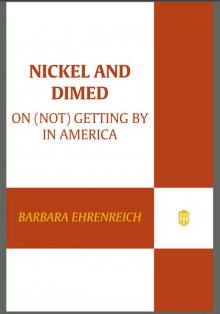 Nickel and Dimed: On (Not) Getting by in America
Nickel and Dimed: On (Not) Getting by in America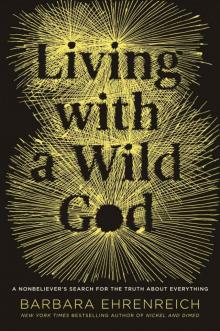 Living With a Wild God
Living With a Wild God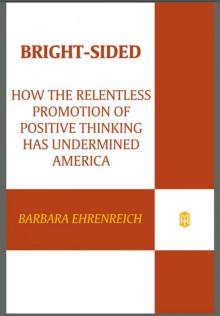 Bright-Sided
Bright-Sided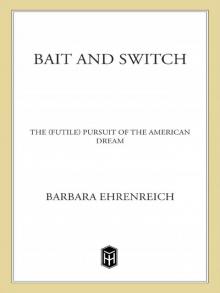 Bait and Switch: The (Futile) Pursuit of the American Dream
Bait and Switch: The (Futile) Pursuit of the American Dream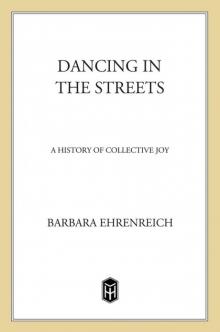 Dancing in the Streets: A History of Collective Joy
Dancing in the Streets: A History of Collective Joy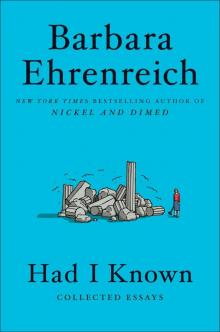 Had I Known
Had I Known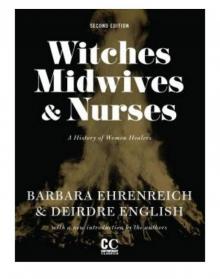 Witches, Midwives, and Nurses
Witches, Midwives, and Nurses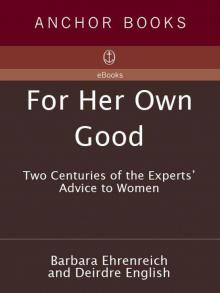 For Her Own Good: Two Centuries of the Experts Advice to Women
For Her Own Good: Two Centuries of the Experts Advice to Women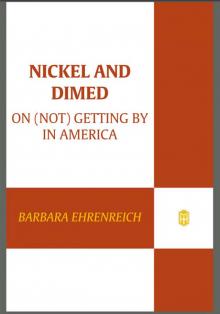 Nickel and Dimed
Nickel and Dimed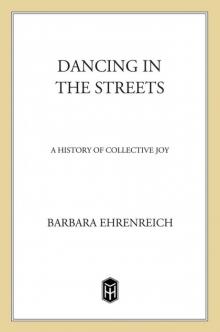 Dancing in the Streets
Dancing in the Streets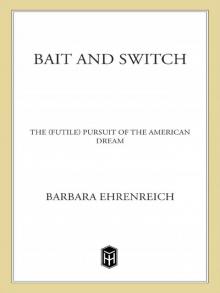 Bait and Switch
Bait and Switch